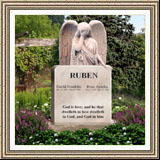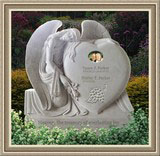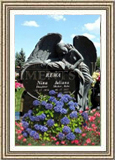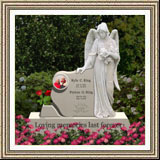|
Learning How to "Talk Grief"
By Harriet Hodgson
I'm a grief writer and know lots of grief words. After
four loved ones died, however, I realized I had to learn
more. Adding to my grief vocabulary helped me to
understand research. New grief words and terms also
helped me to understand my journey. Most important,
these new words and terms helped me evaluate my grief.
The National Cancer Institute, in a website article
titled "Loss, Grief, and Bereavement," defines some
basic grief terms. Grief is defined as the normal
process of reacting to loss. Bereavement is defined as
the time after loss, a painful time of tears and fear
and sadness. Mourning is defined as the process of
adapting to loss. But multiple losses complicated my
grief process and that is why I kept learning how to
"talk grief."
New words and terms helped me to see that my grief was
normal. Unfortunately, some people go through
complicated mourning. Vamik D. Volkan, MD and Elizabeth
Zintl discuss this kind of mourning in "Life After Loss:
The Lessons of Grief." Two types of complicated mourning
caught my attention: denial and perennial mourning.
Denial is self-explanatory; you cannot accept what has
happened. Perennial mourning is more complicated.
"Perennial mourners are locked in a chronic review of
their lost relationship in a an attempt to find
resolution to it," the authors explain.
One of the most unusual terms I learned was "absent
grief." These people are incapable of mourning so their
grief is unresolved. Volkan and Zintl also talk about
perennial mourners, people with severe grief that
becomes depression. Thankfully, I was not a perennial
mourner, absent mourner, or a mourner in denial.
Grief counselor Bob Deits, author of "Life After Loss: A
Practical Guide to Renewing Your Life After Experiencing
Major Loss," sees grief in two ways -- healthy and
distorted. He describes grief as the "nuclear energy of
our emotions." That is why it is important for you and I
to evaluate our grief. Evaluating was not an easy thing
to do, but it is a necessary thing.
Judy Tatelbaum defines many grief terms in her book,
"The Courage to Grieve." Delayed grief is one of these
terms. I know people who have delayed their grief for
years and it is unhealthy. As Tatelbaum explains,
"Delayed grief is the pushing aside of feelings at the
critical early stages of mourning to be dealt with at
some future time." Delaying may keep you functioning,
she goes on to say, but it leaves you open to an
emotional explosion in the future.
From my standpoint, there is no better time to cope with
grief than now. Naturally, I worried about myself when
grief triggers, like the first anniversary of death,
pushed my recovery backwards. I felt better after I read
a Mayo Clinic website article, "Grief: Coping With
Reminders After a Loss," and its assurance that grief
triggers are normal. Now I watch for triggers and
prepare for them.
The grief and bereavement field has its own language.
Nobody -- not me, not you -- wants to learn to "talk
grief." Still, we must face the reality of what has
happened. The reality is that you have lost a dear one,
someone you will miss forever. Learning new grief words
and terms will help you stay on the recovery path. In
time, your words of sorrow will become words of joy.
Please believe me when I say this, for I have found it
to be true. |





